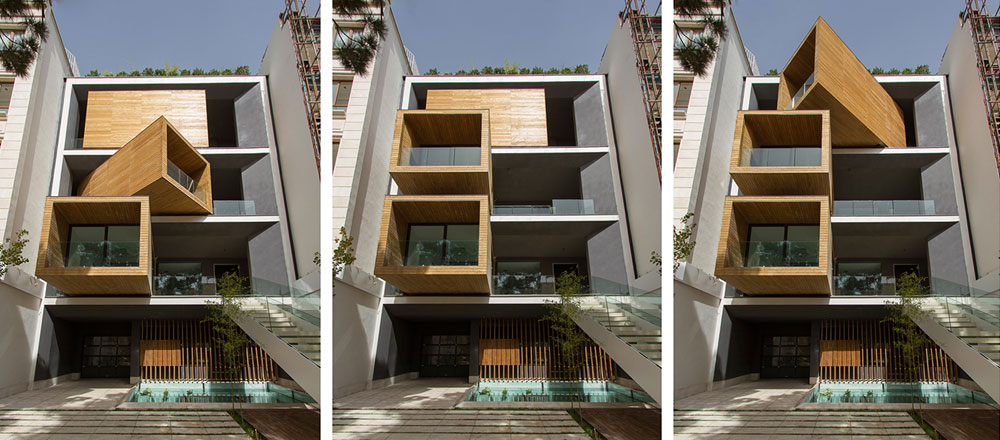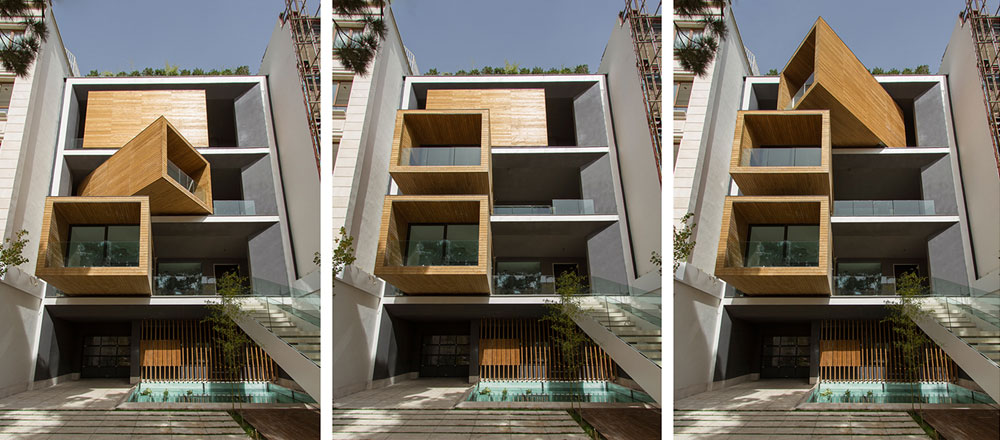About face: Townhouse in Tehran

Precise mechanical engineering was necessary for the realisation of this single-family house in Tehran. The building, which has a narrow frontage in relationship to its depth, can be given a three-dimensional look with the help of box elements that can be turned in and out on its front façade.
Architect: nextoffice, Tehran
Location: No. 3, Sharifi Dead-End, Saleh Hosseini St., Darrous, Teheran, Iran
Architect: nextoffice, Tehran
Location: No. 3, Sharifi Dead-End, Saleh Hosseini St., Darrous, Teheran, Iran
The front on this Tehran townhouse designed by the Iranian office Next Architects can take on an introverted or extroverted look according to wish. The team of architects planned the single-family dwelling completely in line with the needs and wishes of the client, coming up with an ingenious and highly distinctive frontage in a design process in which such concepts as uncertainty and flexibility played an instrumental role.
Three swivelling boxes clad in wood can be turned 90° to face inward or outward using a mechanism similar to those employed in the rotating sets used in theatrical productions or car showrooms. The three-dimensional elements make the new building stand out against the static facades of the neighbouring houses.
Three swivelling boxes clad in wood can be turned 90° to face inward or outward using a mechanism similar to those employed in the rotating sets used in theatrical productions or car showrooms. The three-dimensional elements make the new building stand out against the static facades of the neighbouring houses.
The rotating boxes not only determine the appearance of the building but also reflect the desires of the occupants for either seclusion or a more outgoing mode, and can also be adapted to differing weather conditions. The house thus presents itself with an open or closed configuration, similar to traditional typologies in Iranian housing construction.
When all the wooden cubes are turned inwards, the result is a compact volume with few openings and thus only a minimal relationship to the outside world. When revolved outwards, the result is inviting in effect and provides views into the interior. When swung outwards, the cubes also create space for wide, large terraces and thus represent a gain in quality of life for the occupants.
When all the wooden cubes are turned inwards, the result is a compact volume with few openings and thus only a minimal relationship to the outside world. When revolved outwards, the result is inviting in effect and provides views into the interior. When swung outwards, the cubes also create space for wide, large terraces and thus represent a gain in quality of life for the occupants.
The structuring of the rooms refers to typical Iranian modes of habitation in that it offers both a winter living-room (Zemestan-Neshin) and a summer living-room (Taabestan-Neshin).
The differing living areas are distributed over seven floors, whereby the adjacent wooden boxes act as multi-functional rooms that can be adapted to the needs of the users. Depending on the degree to which they are turned, they also provide attractive views of the outside.
The differing living areas are distributed over seven floors, whereby the adjacent wooden boxes act as multi-functional rooms that can be adapted to the needs of the users. Depending on the degree to which they are turned, they also provide attractive views of the outside.
Along with the swivelling boxes, an atrium extending over three stories plays an instrumental role for the interior, providing the house with daylight and determining its character with differing direct and indirect lighting scenarios.
Project data
Client: Mojgan Zare Neyeri, Farshad Sharifi Nikabadi
Design: Alireza Taghaboni, Roohollah Rasouli, Ferideh Aghamohammadi
Construktion engineer: Imen Sazeh Fadak Consulting Eng
Structural engineer: Sohrab Falahi
Construction phase: 2010 – 2013
Project data
Client: Mojgan Zare Neyeri, Farshad Sharifi Nikabadi
Design: Alireza Taghaboni, Roohollah Rasouli, Ferideh Aghamohammadi
Construktion engineer: Imen Sazeh Fadak Consulting Eng
Structural engineer: Sohrab Falahi
Construction phase: 2010 – 2013
